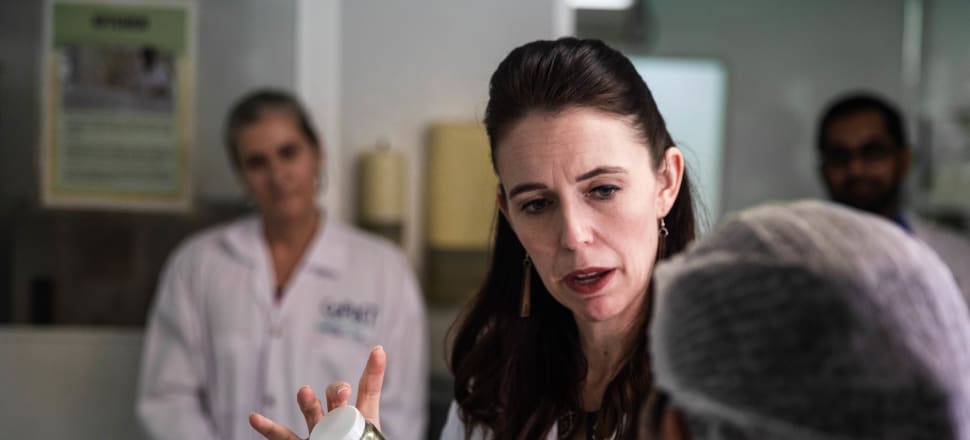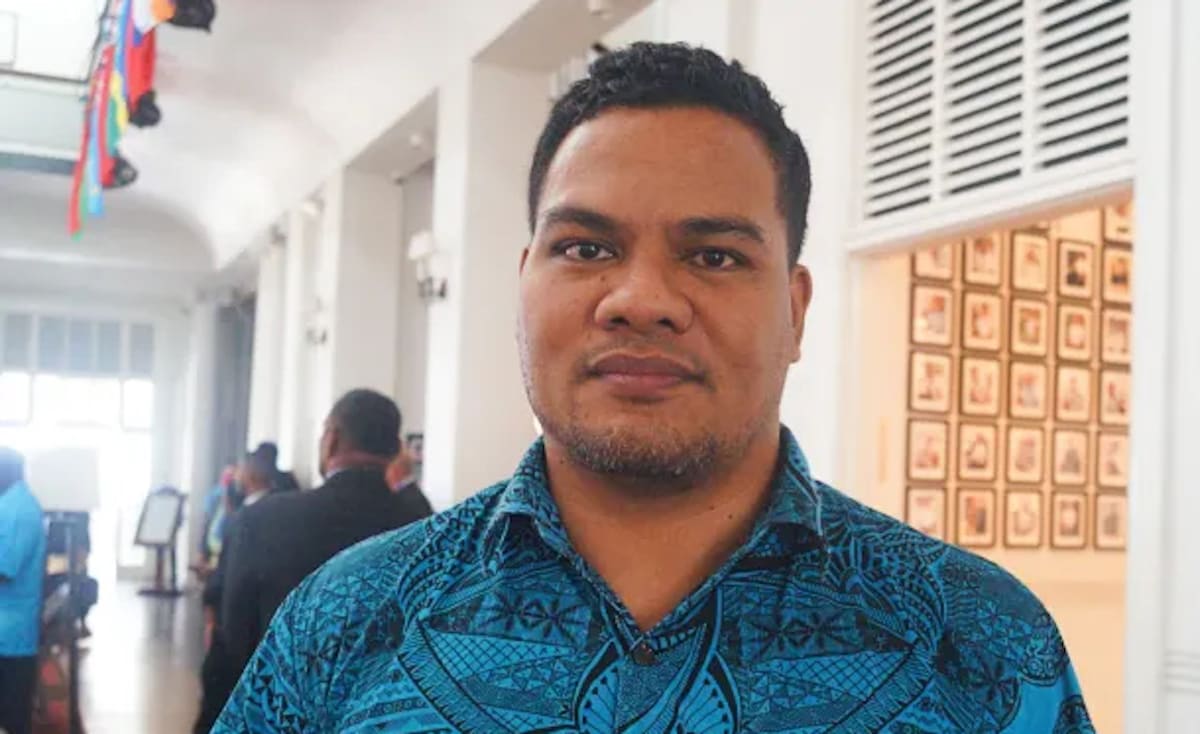
The Prime Minister has committed more money towards tackling climate change in her visit to the Pacific Islands Forum - but the spending of the superpowers in other areas, including a suite of new Pacific initiatives from the United States, has also dominated the agenda, as Sam Sachdeva reports from Suva
Given climate change is one of Jacinda Ardern's top priorities, she places an understandable emphasis on the issue during her visits to the Pacific.
The centrepiece of the Prime Minister’s first day at the Pacific Islands Forum in Suva was a visit to the Centre for Pacific Crops and Trees, a seed bank which preserves the region’s unique crops and trees to guard against the threat of plant extinction.
Announcing a $10 million investment into the centre as part of the Government’s $1.3 billion climate aid fund, Ardern spoke about the crucial nature of its work.
“You are literally Noah's Ark: the seeds and plants here, and the gene bank that you provide, and it is so important to us as a region.”
But just as an invasive weed can overwhelm native ecosystems, so too are geopolitical tensions in the Pacific threatening to overwhelm the region’s emphasis on climate action.
Recent jostling for position between the United States and China has contributed to the huge turnout from the world’s media, with roughly 180 journalists believed to have descended upon the Fijian capital to follow proceedings.
If constant questions about China’s influence surely frustrate some Pacific leaders who see a more existential threat looming ever closer, it can also be difficult to disentangle the two.
Take Tuvalu, whose foreign minister Simon Kofe withdrew from a crucial United Nations oceans conference in Portugal last week in protest at China’s decision to block Taiwanese delegates from taking part.
Tuvalu is just one of four Pacific nations to maintain diplomatic relations with Taiwan, having previously rejected Chinese overtures to switch allegiances.
Speaking to Newsroom on the sidelines of the forum, Kofe said the country recognised its position would draw pressure from China, but the superpower’s threat to challenge the credentials of Tuvalu’s entire delegation was a step too far.

“We would have done it to anyone else, whether to the US or any of the bigger countries that, kind of looked down on countries like Tuvalu, we would take the same stance.”
Kofe told Newsroom he did not want to speculate on whether China had played any role in the shock withdrawal of Kiribati from the forum, but said regional geopolitics had occupied a significant portion of conversations at the foreign ministers’ meeting last week.
“As we see, it is just intensifying over time, and so the key message - at least what I heard from the members - is that we need, the Pacific needs to define for ourselves the terms of our engagement with our partners and with the bigger countries outside the region.”
With pressure coming from both sides, Tuvalu wanted to “rise above” the tensions and focus on the issues of greatest importance to the Pacific.
“We do have a history of outside powers coming in and really having a negative impact on the region, and so we just have to be smart in how we approach it, partners and countries from outside.”
Fiji prime minister Frank Bainimarama did not shy away from the topic at the forum’s opening dialogue on Tuesday morning, speaking about a “hotly competitive” geopolitical landscape.
“We see a multipolar system emerge, featuring major superpower rivalry, alongside a number of middle powers, all clamouring to shake the world in their favour.”
Forum secretary-general Henry Puna likewise spoke about “a dynamic and shifting geopolitical landscape that we have no option but to engage with”, concluding somewhat ominously: “Our region remains in a precarious position, both in the short and in the long term.”
US stepping up in Pacific
And the scene is set for yet more talk of Great Power rivalry on Wednesday, when US vice-president Kamala Harris will address the forum and outline a suite of new efforts to step up American engagement in the Pacific.
That Harris is even being permitted to speak is notable, given the ostensible decision of forum leaders to cancel the observer dialogue at which non-members like the US usually participate. But the commitments are striking too, including the opening of new embassies in Kiribati and Tonga, the appointment of an inaugural US envoy to the Pacific Islands Forum, and the creation of the country’s first ever Pacific Islands strategy.
The Biden administration will also ask Congress to nearly triple the amount of annual funding going towards fisheries work in the region, a 10-year package worth US$600 million ($980m).
In a background briefing ahead of Harris’ speech, a senior administration official told media the vice-president’s announcement would reflect “a true partnership based on friendship and respect and transparency”.
“Everything we do with regard to the region will be in consultation with the region - we will listen and consult closely…and we'll continue to engage constructively and transparently, with our Pacific Island partners every step of the way.”
The official acknowledged “an intense interest in the Pacific Islands among other countries”, but brushed off suggestions the package was part of a battle for influence between the US and China.
“Our emphasis is on the positive part of our agenda rather than in terms of competition, and we've made it clear around the world: we're not asking countries to choose, we're not asking countries not to have relations with China as a big important country…
“Of course, contrasts will be made, and we'd like to think that that contrast looks favourably on us where we've been a responsible security actor in the region and respecting the entire Indo-Pacific for many decades, and helping to preserve a free and open Indo-Pacific.”
China surging, US 'waning'
But it is hard to avoid the conclusion drawn by Ardern who, speaking before the new US commitments were made public, contrasted China’s increasing activity in the region with “waning” American engagement in recent years.
If you leave a gap, it is hard to express outrage when it is filled, and Biden’s Indo-Pacific tsar Kurt Campbell appeared to accept critiques of recent US efforts when speaking to a New Zealand audience earlier this year.
“For the United States to be effective in the Pacific, we must do more, and we must do more on areas that matter.”
China’s own areas of interest are set to be a topic of discussion when Ardern meets Solomon Islands leader Manasseh Sogavare on Wednesday, with the Pacific nation’s security deal with Beijing earlier this year creating an outcry in some quarters.
Ardern gave little away about what she intended to say, referring to “things that I'm keen to talk about”, but acknowledged recent telephone discussions with Sogavare about the pact were likely to be brought up again in person.
That diplomatic dance will continue throughout the week, with China's role in the region rarely called out explicitly but nonetheless a constant feature of discussions.
By contrast, Pacific leaders never mince words when talking about the need to tackle climate change, a position made clear by Kofe as he asked for more climate funding from New Zealand and other nations to cover the costs of expensive mitigation and adaptation work.
"We hope that we get the support from our partners to be able to to fund those those projects, but otherwise, the government is already looking at a worst-case scenario.
"We have a plan that is now in place to prepare for a situation where we are forced to relocate, and so that's that's really where we are right now, because the trajectory that we're on is that we're heading for that worst-case scenario."







